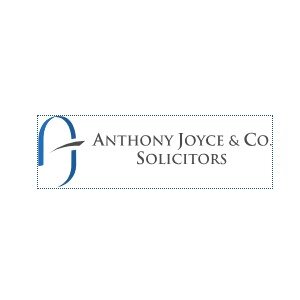Best Bankruptcy & Debt Lawyers in Dublin
Share your needs with us, get contacted by law firms.
Free. Takes 2 min.
List of the best lawyers in Dublin, Ireland
Ireland Bankruptcy & Debt Legal Articles
Browse our 1 legal article about Bankruptcy & Debt in Ireland written by expert lawyers.
- Debt Collectors in Ireland: Verify Debts and Stop Harassment
- In Ireland, regulated lenders and their agents must follow the Central Bank’s Consumer Protection Code and, for mortgages, the Code of Conduct on Mortgage Arrears. Harassment, misleading statements, and excessive contact are prohibited. You can set contact limits and request all communication in writing. Send a written notice and keep... Read more →
About Bankruptcy & Debt Law in Dublin, Ireland
Bankruptcy and debt law in Dublin, Ireland, involves the legal processes and regulations governing financial insolvency, where an individual or business cannot repay their outstanding debts. The laws are designed to provide relief to debtors while ensuring fair treatment for creditors. Bankruptcy proceedings can result in the liquidation of assets to pay off debts, while various debt restructuring options are available to help individuals and businesses manage their financial obligations.
Why You May Need a Lawyer
People may require legal help in bankruptcy and debt matters for various reasons:
- Insolvency: If you or your business cannot pay off debts, a lawyer can help navigate the complex process of bankruptcy filings and proceedings.
- Debt Negotiation: Lawyers can negotiate with creditors to settle debts or come up with a manageable repayment plan.
- Legal Representation: In disputes related to creditor harassment or repossessions, having legal representation can protect your rights.
- Asset Protection: Lawyers can advise on how best to protect certain assets from being seized in bankruptcy proceedings.
- Business Continuity: For businesses facing insolvency, legal counsel can guide through restructuring or winding up operations while seeking to protect employees and shareholders.
Local Laws Overview
Bankruptcy and debt laws in Dublin, Ireland, are governed under various statutory provisions:
- Bankruptcy Act 1988: Provides the framework for declaring personal bankruptcy.
- Personal Insolvency Act 2012: Introduced mechanisms like Debt Relief Notices (DRNs), Debt Settlement Arrangements (DSAs), and Personal Insolvency Arrangements (PIAs).
- Companies Act 2014: Governs the winding up and restructuring of insolvent companies.
- High Court: Handles bankruptcy cases and has the power to adjudicate an individual as bankrupt.
- Insolvency Service of Ireland (ISI): Regulates personal insolvency practitioners and processes.
Frequently Asked Questions
What is bankruptcy?
Bankruptcy is a legal process where individuals or entities unable to meet their debt obligations have their assets distributed among creditors.
How do I file for personal bankruptcy in Dublin?
To file for personal bankruptcy, you must submit a petition to the High Court, which involves proving that you are unable to pay your debts and meeting specific asset and debt thresholds.
What is a Debt Relief Notice (DRN)?
A Debt Relief Notice allows for the write-off of qualifying debts up to €35,000, subject to conditions and after a three-year supervision period.
What is a Personal Insolvency Arrangement (PIA)?
A PIA involves the restructuring of both secured and unsecured debts over a period of six years, with the possible extension to seven years, under the oversight of a Personal Insolvency Practitioner (PIP).
Can my assets be seized during bankruptcy?
Yes, during bankruptcy proceedings, most of your assets can be seized and sold to pay off your creditors, with certain exemptions for necessities.
What is a Debt Settlement Arrangement (DSA)?
A DSA enables individuals to settle unsecured debts over a period of up to five years, extendable under certain conditions, through agreed payments with creditors.
Will bankruptcy affect my credit rating?
Yes, filing for bankruptcy will adversely affect your credit rating and can make obtaining future credit more difficult for several years.
How can a lawyer help in bankruptcy proceedings?
A lawyer can provide essential guidance, help complete necessary paperwork, represent you in court, and advise on protecting your assets and legal rights.
What is the role of the Insolvency Service of Ireland (ISI)?
The ISI regulates personal insolvency arrangements and practitioners and oversees the administration of these arrangements.
Can a business file for bankruptcy in Dublin?
Businesses in Dublin cannot declare bankruptcy but may undergo liquidation or examinership processes under the Companies Act 2014 to deal with insolvency.
Additional Resources
For further assistance, consider the following resources:
- Citizens Information: Provides basic information on bankruptcy and debt options.
- Insolvency Service of Ireland (ISI): Offers guidance on personal insolvency processes and authorized practitioners.
- Money Advice and Budgeting Service (MABS): Offers free, confidential budgeting and advice services.
- Law Society of Ireland: Can help you find a qualified lawyer specialized in bankruptcy and debt law.
- High Court of Ireland: Handles bankruptcy filings and related proceedings.
Next Steps
If you need legal assistance in bankruptcy and debt matters, consider taking the following actions:
- Consult a Lawyer: Contact a qualified lawyer who specializes in bankruptcy and debt law for a consultation.
- Gather Financial Information: Collect all relevant financial documents including statements, bills, and asset listings.
- Explore Options: Review all available debt relief options with your legal advisor to find the best solution for your situation.
- Prepare for Filing: If necessary, prepare the required paperwork for filing for bankruptcy or any other debt relief mechanism.
- Follow Legal Advice: Adhere to the guidance provided by your legal representative to ensure a smooth legal process.
Lawzana helps you find the best lawyers and law firms in Dublin through a curated and pre-screened list of qualified legal professionals. Our platform offers rankings and detailed profiles of attorneys and law firms, allowing you to compare based on practice areas, including Bankruptcy & Debt, experience, and client feedback.
Each profile includes a description of the firm's areas of practice, client reviews, team members and partners, year of establishment, spoken languages, office locations, contact information, social media presence, and any published articles or resources. Most firms on our platform speak English and are experienced in both local and international legal matters.
Get a quote from top-rated law firms in Dublin, Ireland — quickly, securely, and without unnecessary hassle.
Disclaimer:
The information provided on this page is for general informational purposes only and does not constitute legal advice. While we strive to ensure the accuracy and relevance of the content, legal information may change over time, and interpretations of the law can vary. You should always consult with a qualified legal professional for advice specific to your situation.
We disclaim all liability for actions taken or not taken based on the content of this page. If you believe any information is incorrect or outdated, please contact us, and we will review and update it where appropriate.
Browse bankruptcy & debt law firms by service in Dublin, Ireland
Dublin, Ireland Attorneys in related practice areas.











